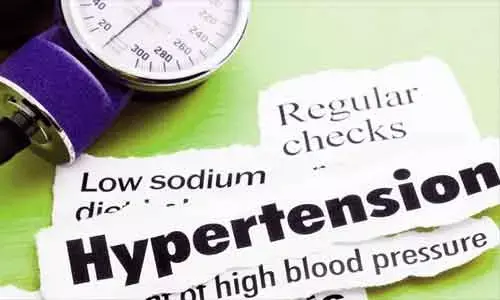- Home
- Medical news & Guidelines
- Anesthesiology
- Cardiology and CTVS
- Critical Care
- Dentistry
- Dermatology
- Diabetes and Endocrinology
- ENT
- Gastroenterology
- Medicine
- Nephrology
- Neurology
- Obstretics-Gynaecology
- Oncology
- Ophthalmology
- Orthopaedics
- Pediatrics-Neonatology
- Psychiatry
- Pulmonology
- Radiology
- Surgery
- Urology
- Laboratory Medicine
- Diet
- Nursing
- Paramedical
- Physiotherapy
- Health news
- Fact Check
- Bone Health Fact Check
- Brain Health Fact Check
- Cancer Related Fact Check
- Child Care Fact Check
- Dental and oral health fact check
- Diabetes and metabolic health fact check
- Diet and Nutrition Fact Check
- Eye and ENT Care Fact Check
- Fitness fact check
- Gut health fact check
- Heart health fact check
- Kidney health fact check
- Medical education fact check
- Men's health fact check
- Respiratory fact check
- Skin and hair care fact check
- Vaccine and Immunization fact check
- Women's health fact check
- AYUSH
- State News
- Andaman and Nicobar Islands
- Andhra Pradesh
- Arunachal Pradesh
- Assam
- Bihar
- Chandigarh
- Chattisgarh
- Dadra and Nagar Haveli
- Daman and Diu
- Delhi
- Goa
- Gujarat
- Haryana
- Himachal Pradesh
- Jammu & Kashmir
- Jharkhand
- Karnataka
- Kerala
- Ladakh
- Lakshadweep
- Madhya Pradesh
- Maharashtra
- Manipur
- Meghalaya
- Mizoram
- Nagaland
- Odisha
- Puducherry
- Punjab
- Rajasthan
- Sikkim
- Tamil Nadu
- Telangana
- Tripura
- Uttar Pradesh
- Uttrakhand
- West Bengal
- Medical Education
- Industry
Fighting hypertension through applying electrical impulses on vagus nerve

Electrical impulses applied to a particular branch of the vagus nerve could be used in the future to reduce complications of arterial hypertension. These are the results of a research conducted, on animal models, by the Department of Angiocardioneurology and Translational Medicine of the I.R.C.C.S. Neuromed, in Italy, and published in the scientific journal Cell Reports.
The research origins from the role that immune system plays in the genesis and development of high blood pressure, with the spleen as a main character: it is there that specific immune cells, T lymphocytes, are activated and then released into the blood, migrating to the organs typically affected by hypertension ("target organs"). On one hand, they contribute to the etiology of the hypertensive condition, on the other they cause the well-known related damages. The T lymphocytes activation process, as already stated by previous observations conducted by the same Department, is the result of an interaction between parasympathetic and sympathetic nervous systems, at the level of celiac vagus nerve and splenic nerve.
"First of all - says engineer Lorenzo Carnevale, first author of the paper - with this research we observed that Angiotensin II (AngII, an hormone involved in the control of blood pressure, ed) is capable of increasing nerve impulses which, through the celiac branch of the vagus nerve in k, stimulate T lymphocytes activation in the spleen. But we were able to obtain the same effect also by applying electrical impulses, of specific frequency and amplitude, to the same nerve".
In other words, a bioelectronic intervention is able to modulate lymphocyte activation in the spleen. "This is a first step - says Carnevale - showing us the possibility to intervene by electronic means, without drugs, on some fundamental mechanisms of hypertension. In the immediate future we aim to identify specific bioelectronic stimulation techniques capable of therapeutically influencing the immune system activity in the spleen".
"Arterial hypertension - comments Giuseppe Lembo, Professor at the Faculty of Medicine of the "Sapienza" University of Rome and Director of the Department of Angiocardioneurology and Translational Medicine - is a huge public health problem, affecting around one billion people in the world. Despite currently available therapies, an optimal control of blood pressure levels is often not achieved. This research, which of course will need further studies to find clinical applications, shows us the possibility of developing brand new, non-pharmacological, therapies that could help a large number of patients".
Hina Zahid Joined Medical Dialogue in 2017 with a passion to work as a Reporter. She coordinates with various national and international journals and association and covers all the stories related to Medical guidelines, Medical Journals, rare medical surgeries as well as all the updates in the medical field. Email: editorial@medicaldialogues.in. Contact no. 011-43720751
Dr Kamal Kant Kohli-MBBS, DTCD- a chest specialist with more than 30 years of practice and a flair for writing clinical articles, Dr Kamal Kant Kohli joined Medical Dialogues as a Chief Editor of Medical News. Besides writing articles, as an editor, he proofreads and verifies all the medical content published on Medical Dialogues including those coming from journals, studies,medical conferences,guidelines etc. Email: drkohli@medicaldialogues.in. Contact no. 011-43720751


